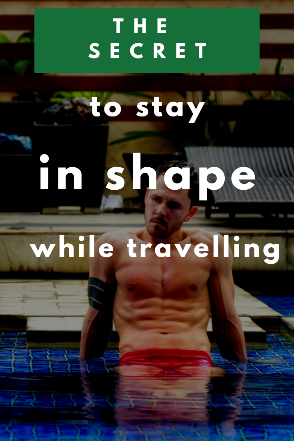
It’s not a secret that long-term traveling takes a toll on our bodies. People leaving on a 1-week holiday won’t see a big difference eating unhealthy for a week because it’s not enough time for the body to suffer from a radical change of eating out. But for long-term travelers, what I have observed for more than 10 years on the road is that women will gain weight, while men slightly lose weight. Girls have been complaining how unfair this is, but my reasoning about all this is pretty simple: The loss of weight in men is due to loss of muscle which causes a decrease in weight, compensating for the gain in weight caused by extra fats gained as much as women.

Those who know me for long enough know that I have been health-minded all my life. And being on the road for more than 10 years has had me testing different diets and strategies to keep in the best shape as possible, all of this while traveling. Combining this with the occasion modeling jobs I do in South East Asia every year, I have to stay at my best all the time. This is a hard challenge because it is much harder to stay in shape when I don’t have access to a kitchen and can’t cook my own food. Adding to this the availability of ingredients changes from country to country, it adds to the challenge. Becuase it really is true that abs are mostly made in the kitchen rather than in the gym.
The Importance of Protein on a Diet
I am no Vegetarian. In fact, I love Meat and I am a strong advocate of eating a lot of meat. Vegetarians will be quick to point me out all the researchers that have been indicating the carcinogens attributes of meat but so does all these pesticides they eat in their veggies. I will not get into this here, as I want to focus on the balance of Macronutrients in a Diet. Do we need protein? Yes of course, and a lot! Back in the days we would feed on meat alone and get a lot of our daily micronutrients needed, just as our ancestor cavemen would do while feasting on a fresh catch after hunting.
People can learn more about Macros and how to balance them in their daily intake but in a nutshell, you need a certain amount of Carbohydrates, fats, and Proteins every day. There are ways to define the average share of each, but a good start is an eaual amount of each macro in terms of their caloric intake. The problem with travelling is that by eating out in restaurants all the time, most of the food that is available out there are Carbs and Fats. Doesn’t matter the quality of the restaurant, fast food or fancy French restaurant, it is really hard to reach the recommended daily protein intake. Most people eat under 30g of protein daily, which is about 1/4 of what they should really consume daily. Travelers eat even less than that…
The reason protein consumption is low is fairly simple: Protein is expensive, and carbs are cheap. Fats are Tasty. So the recipe is easy for restaurants: Fill peoples meals with carbs and provides a low amount of protein as possible will make them feel satisfied at low cost. Add Fats for taste. Carbs are overly available in most meals, just think about Flour (dough, bread, spaghetti, etc…), Rice, Potatoes. Whatever you order at a restaurant will be mostly a small ratio of proteins, with a large side of carbs.
How Much Protein do I Need?
Well the RDA (Recommended Daily Allowance) states that a healthy adult should consume about 0.8g of protein per kg of body weight. So for a person like me at 74 kg, that would make a minimum of about 60g. However, I believe these figures are highly devalued. For active people in their 20s and 30s that go to the gym, or even active travelers walking all day discovering new places, it is widely known that the protein intake should be between 1g of protein per pound of body weight. Since I am 160 pounds, that is minimum 160g of protein daily. But that is mostly for bodybuilders and muscular men, so that wouldn’t apply to everybody. In general, I would say between 0.6 and 0.8g per pounds of bodyweight is the ideal.
Protein is hard to find.
As I stated, protein is hard to find. It is not as easy as to fill up with carbs where somebody could just eat a few pieces of bread and fill their daily carb allowance. 160g of carbs is really hard to find on the road. When I’m living in a place with a kitchen, it’s not a problem as I can cook for myself. Eating a mix of meat, poultry, eggs, beans, nuts, cheeses, I can reach my daily needs. But it’s not as easy on the road when you rely on restaurants and trying to do so only in restaurants will prove too hard to accomplish. For example, a simple cheeseburger (at McDonald’s for example) has more or less 33g of carbs, 12g fat and only 15g of protein. To put this into perspective, this means you would need to eat more than 10 cheeseburgers every day to reach the 160g daily protein intake. That is only in theory because as 10 cheeseburgers would satisfy the protein intake, it would explode the daily fats intake, consuming 120g is way too much and would result in overeating as in my case, I eat about 60g fats daily.
My Protein hacks on the road
I’ve developed my own tricks through the years to keep my protein intake high while I travel. First, whenever I can get a hold on a kitchen through Airbnb and hostels, I go to local markets and supermarkets and buy myself some fresh food that I can prepare and cook. You don’t need to become a chef, but knowing how to cook is a plus.
Eggs are a great way to get some healthy protein in the morning, eat 3 or 4 (just only eat half the egg yolk as it would make it too fatty). 4 egg whites provide a nice 20g protein and no carbs, no fats. A great start
Eat chicken. You can find whole roasted chicken in many places around the world, in supermarkets and markets. It’s definitely worth the money, it’s a cheap protein source. I eat half of it and keep the other half for the next day.
Fish: widely available and low in fats and carbs.
Beans: Vegetarians swear by them, I like them too. Kidney beans, chickpeas, white beans, lentils and soy beans. they make a great source of protein, even though they pack carbs with them, so eat them wisely.
Cheese: I love cheese, they are widely available all over the world and a nice way to eat local products. however, they pack a lot of fats usually around 50% so you have to watch out. As a protein intake, I love Cottage cheese because it is very low on fat and carbs while packing a lot of protein. In some countries however, it’s really expensive, or plainly unavailable. So I even make my own cottage cheese out of a pint of milk, its super easy, takes very little time to make and it’s delicious!
Nuts: watch out, as they are 90% fat. Healthy fats, so I love them, but definitely not a source to stack up on protein.
My Bonus Protein Trick
Buy a pot of Whey Protein! Yes, Whey. Its super healthy and provides a great way to have a quick dose of protein to reequilibrate my macros in a day when I can’t find the good meals to provide them naturally in food. People that doubt on the healthiness of Whey and believe its only for bodybuilders are just plain wrong. a bit of research on their side would make them understand that Whey is a natural component coming from Milk. Even the legendary DR. Mercola recommends Whey in his top 10 list of Superfoods. So for me, it’s a no-brainer. Travelers are active people, moving a lot in activities every day compared to the typical sedentary person, so if a scoop of whey can be justified for the guy that spends 30 minutes in a gym, it can definitely be justified for the active traveler who walks 15 to 20km visiting a city in a day. Usually, I would buy myself a bag of whey when I stay a month or longer in a place. But I have been experimenting with carrying a bag with me when I’m on the road, making space for a small 1 pound bag in my luggage. And so far, I love it. Its easy to mix it with oats in the morning, with a bit of milk.
Conclusion
With years of experimenting, I have tested many diets and a medium to high protein diet has provided me with the best results to maintain a healthy body while I travel. I know how my body reacts to it and whenever I go to some areas of the world where I lack protein like in Africa and start feeding on carbs and fats only, I can feel the toll on my body and start feeling out of shape, even start getting colds and feel weaker while usually I’m never sick. So experiment yourself with my strategy and see for yourself what best works for you. But finding the best diet for your body while traveling is amazing, as you will feel your best self and won’t feel guilty of traveling, having to “come home to get in shape”… You’ll be ever healthy, independent and location free while feeling good in your body!
Pin to Pinterest
Click “Pin It” on The image below to help others find this article on Pinterest!

Support Ian with a TIP or Donation
Like what I do? Tips and donations like yours are what keeps this site alive. Its simple and quick, and makes a big difference.Offer me a Coffee !
Why not take 30 seconds to offer me a coffee and show your appreciation. A small gesture that goes a long way!Crypto Donations
BTC: bc1qwjy4s7t399jztr7ypnzlwlkd5d4wamnsz3582d
ETH: 0x4C1Ad7546f8a8e17FDD667f3fc837632Dff5bA85
LTC: ltc1qw2gfkuegaun8u5gzv0ua070n5pu3zak9je3tul






